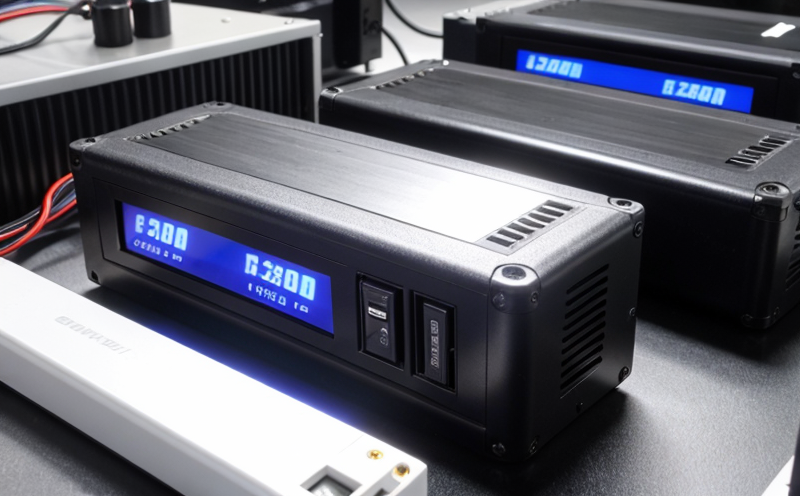ASTM F3117 Lithium Primary Cell Performance Testing for Medical Use
The ASTM F3117 standard provides a comprehensive framework for testing lithium primary cells intended for medical use. This service ensures that the performance of these cells meets stringent safety, reliability, and efficacy criteria essential in healthcare applications. The testing protocol is designed to assess critical parameters such as energy density, voltage retention, shelf life, and temperature stability under various environmental conditions.
Quality managers and compliance officers rely on this service to ensure their products comply with international standards. For R&D engineers, it offers a reliable method for validating new designs against industry benchmarks. The testing process includes multiple stages: initial qualification tests to screen out non-compliant units, followed by accelerated aging procedures to simulate long-term use in harsh environments.
The ASTM F3117 standard is particularly important because it addresses the unique demands of medical applications where reliability and safety are paramount. It ensures that lithium primary cells perform consistently across different devices and conditions, reducing the risk of failures that could jeopardize patient safety or disrupt critical medical procedures.
Compliance with this standard enhances a company’s reputation in the healthcare sector by demonstrating its commitment to quality and safety. This is especially relevant given the growing emphasis on regulatory compliance and patient-centric design in the medical industry.
The testing process begins with careful specimen preparation, ensuring that each cell undergoes identical conditions before testing. The equipment used includes high-precision measuring instruments capable of detecting minute variations in voltage and capacity. Data collected during these tests is meticulously analyzed to ensure accuracy and reproducibility.
ASTM F3117 also emphasizes the importance of real-world applicability by incorporating stress tests that mimic actual usage scenarios. This ensures that the tested cells not only meet theoretical performance criteria but are also robust enough for practical deployment in medical devices.
The results from ASTM F3117 testing provide detailed insights into the cell’s performance characteristics, which can be used to optimize product design and manufacturing processes. Compliance with this standard is a key requirement for manufacturers aiming to gain market access to countries that regulate medical devices rigorously.
Benefits
Compliance with ASTM F3117 offers numerous benefits, including enhanced product reliability and safety. By adhering to this standard, companies can ensure their lithium primary cells meet the highest industry standards, thereby increasing customer confidence and trust.
This service also helps in reducing the risk of product recalls due to performance issues or failures during critical use. For R&D teams, it provides valuable data that can be used to improve future iterations of products. Additionally, successful compliance with ASTM F3117 can open doors to new market opportunities, particularly in regions where stringent regulatory requirements are enforced.
Furthermore, the testing process ensures that all cells meet the specific energy density and shelf life requirements necessary for medical applications. This not only enhances product performance but also extends the useful life of devices, leading to cost savings for both manufacturers and end-users.
The detailed reports generated from ASTM F3117 testing are invaluable tools for quality control departments. They provide comprehensive data that can be used to identify potential areas for improvement in manufacturing processes or design adjustments. This continuous feedback loop ensures that products remain at the forefront of technological advancements, meeting evolving industry standards and expectations.
Competitive Advantage and Market Impact
The ability to offer ASTM F3117 compliance testing sets laboratories apart in the competitive medical device market. It positions them as trusted partners capable of delivering high-quality, reliable products that meet stringent regulatory requirements.
Manufacturers who invest in this service can differentiate themselves by providing superior product quality and reliability. This enhances their reputation among healthcare providers and end-users, leading to increased customer loyalty and repeat business.
In the global market, compliance with ASTM F3117 can be a key differentiator for medical device manufacturers aiming to penetrate high-regulation markets. It demonstrates a commitment to excellence that can attract international clients seeking dependable suppliers of lithium primary cells.
By ensuring their products meet or exceed ASTM F3117 standards, companies can anticipate regulatory changes and market trends more effectively. This proactive approach allows them to stay ahead of competitors who may not have the same level of expertise in these areas.
Use Cases and Application Examples
| Use Case | Description |
|---|---|
| Implantable Medical Devices | Lithium primary cells are crucial for powering implantable devices such as pacemakers and defibrillators. The ASTM F3117 testing ensures these cells have the required energy density, voltage retention, and shelf life to function reliably over extended periods. |
| Portable Medical Equipment | Devices like blood glucose monitors, insulin pumps, and oxygen concentrators rely on lithium primary cells for their portability. ASTM F3117 testing guarantees these cells are safe and reliable under various environmental conditions. |
| Diagnostic Tools | Lithium primary cells power diagnostic tools such as portable ultrasound machines and ECG devices, ensuring accurate readings and continuous operation during critical medical procedures. |
| Surgical Instruments | Powering surgical instruments like laparoscopes requires high-performance lithium primary cells that can withstand rigorous use without compromising performance or safety. |
| Telemedicine Devices | In telemedicine, where remote patient monitoring is critical, reliable and long-lasting lithium primary cells are essential for continuous operation of devices used by healthcare professionals. |
The ASTM F3117 testing process ensures that these cells meet the specific performance requirements necessary for safe and effective use in medical applications. This testing is a critical step in ensuring product reliability, reducing the risk of failure during critical operations, and enhancing overall patient safety.





